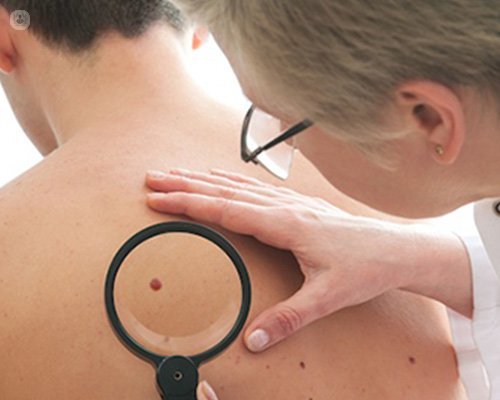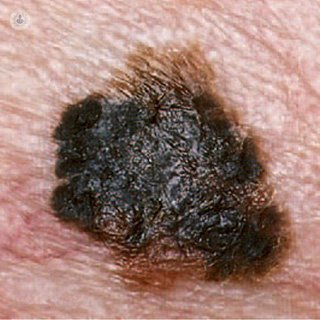Melanoma (skin cancer) – how a skin-check can keep you alive
Written by:Around 13,500 people are diagnosed with melanoma in the UK each year. Skin cancer rates are more than four times higher than 40 years ago and it is the second most common cancer in people under the age of 50. The good news is that melanoma is completely curable if picked up early enough.

Our expert London dermatologist Dr Ben Esdaile explains how a regular check-up can prevent skin cancer…
The increase in melanoma is partly down to being able to diagnose skin cancer better but also due to the ease of foreign travel and sun exposure, which are just as likely to be a big factor.
What causes melanoma?
It appears to be a combination of genetic and lifestyle factors including sun exposure, family history, how easy a patient’s skin burns and having many moles. Many skin cancers develop where they can be seen, which means there is a good chance of catching them early.
Symptoms of skin cancer
The common signs of melanoma include a new unusual mole or a change in an existing mole such as:
- increase in size
- change in shape
- change in colour
- bleeding or crusty
- itchy and sore
Melanomas most commonly appear on the legs of women and on the backs of men but they can appear anywhere on the body including under the nails.
How does a dermatologist diagnose melanoma?
A dermatoscope is a handheld device that allows structures in the skin to be seen that are not seen with the naked eye. Early melanoma has certain structures that can be seen using the dermatoscope and help identify it earlier. It can also help pick up other types of skin cancer. It is the gold standard in screening moles and there is clear evidence it helps pick up melanoma earlier as well as reduce the unnecessary removal of innocent moles.
A full skin-check for melanoma
All of the moles on the body, from head to toe, are examined to detect signs of skin cancer. Other types of skin cancers such as basal cell carcinoma and squamous cell carcinoma can be detected during this procedure also.
Treatment for melanoma
The treatment for skin cancer depends on the type, the stage and the patient’s general health.
Can melanoma be prevented?
The most important way to prevent skin cancer is sun protection. Do not allow the skin to burn, never use sunbeds and protect skin with clothes and broad spectrum sunscreen when exposed to sunlight. Ideally, have an annual professional skin check up with dermoscopy.


